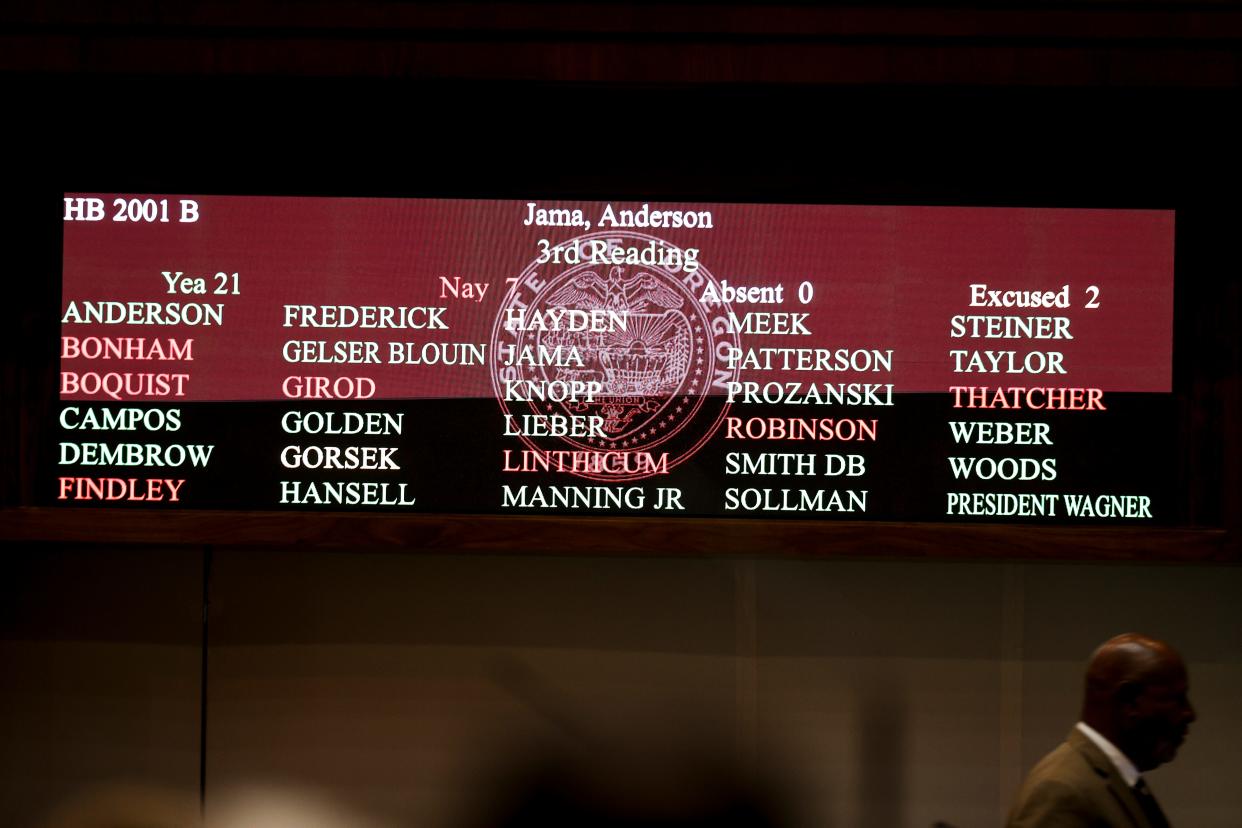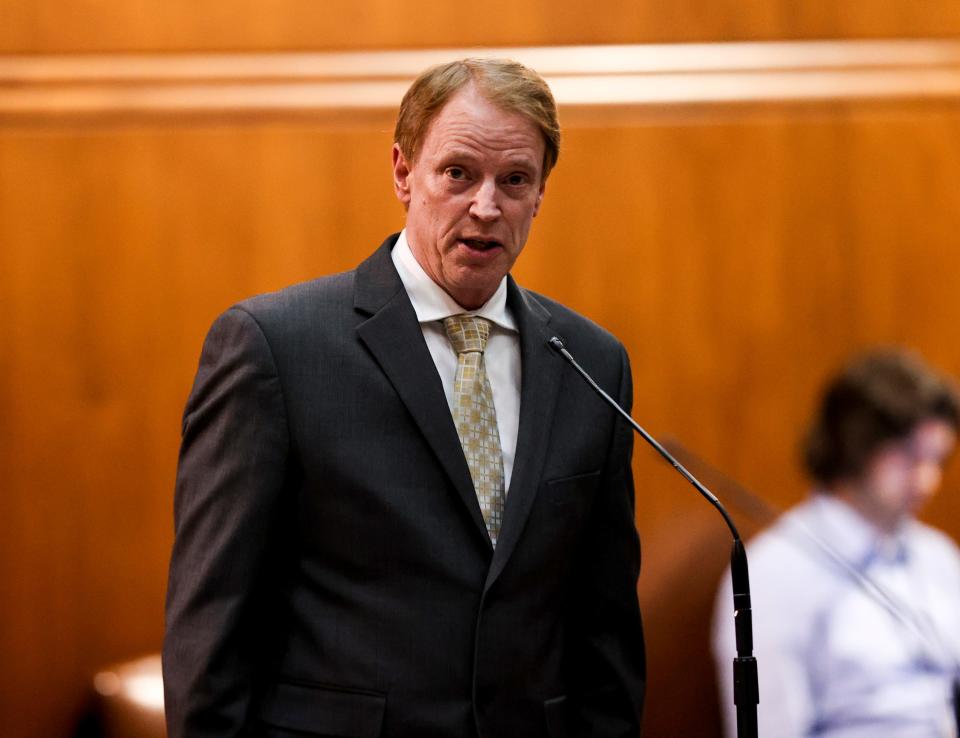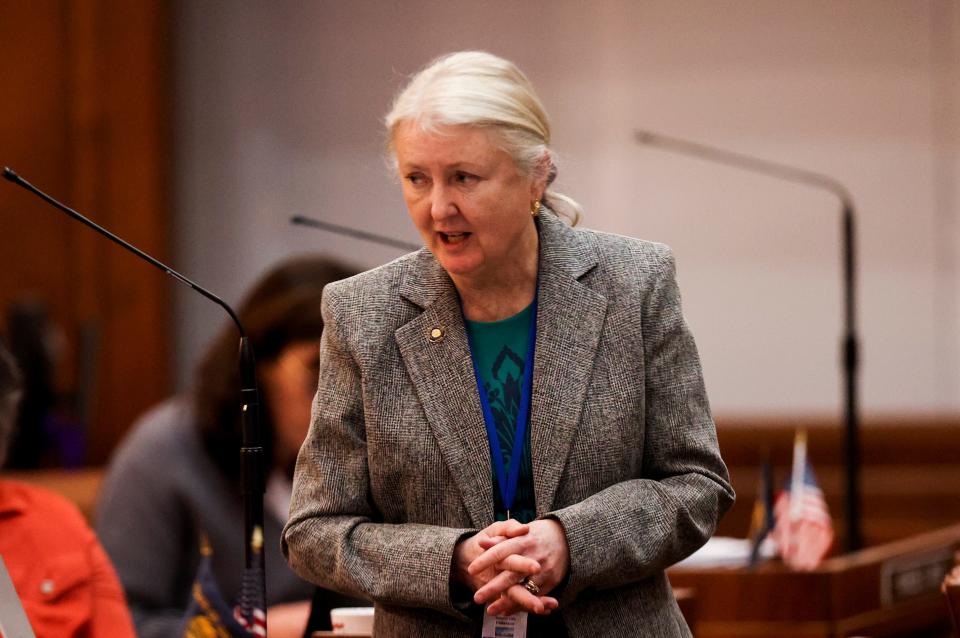$200M homeless and housing package heads to governor's desk

- Oops!Something went wrong.Please try again later.
- Oops!Something went wrong.Please try again later.
- Oops!Something went wrong.Please try again later.
The Oregon Senate voted late Tuesday night to pass a $200 million affordable housing and emergency homelessness response package.
House bills 2001 and 5019 passed the House last week. They now go to Gov. Tina Kotek for her consideration.
Republican and Democratic senators urged support for the package in discussion on the Senate floor before the votes. The bills passed 21-7.
The package includes investments Kotek requested during her first days in office, as well as millions more to address a growing homeless crisis and housing shortage.
In a news conference Wednesday, Senate president Rob Wagner, D-Lake Oswego, referred to the package as an "unprecedented" early session victory.
A ‘catalyst’:Where did the $400M Oregon allocated last year for homelessness go?
What the bills would do
Oregon needs to build more than half a million homes in the next two decades to meet expected demand, according to an Oregon Housing Needs Analysis. Cities with more than 10,000 people would be required to set building targets for specific income levels and then build them and could face action from the state Department of Land Conservation for failing to meet those building targets.
The Housing and Community Services Department would also be required to update a publicly available statewide housing production dashboard on an annual basis to include information on the progress toward housing production by affordability levels, total housing targets and analysis of progress in comparison to the region and other local governments with similar market types.

It's a process that fosters a partnership and creates accountability, Rep. Maxine Dexter, D-Portland, said during Wednesday's conference.
"The state is going to be accountable to helping make sure that we get the resources that cities need and the city is going to be accountable for actually building the housing that they need across all levels of affordability," Dexter said.
Investments proposed in the bills include:
$33.6 million for rent assistance and other eviction prevention services to prevent an estimated 8,750 households from becoming homeless.
$23.8 million for 600 low-barrier shelter beds across the state and for more housing navigators to connect unsheltered Oregonians to shelter and services.
$55.4 million for prepaid rental assistance to rehouse at least 1,200 unsheltered households, block leasing at least 600 vacant homes, landlord guarantees and incentives, and other re-housing services.
$5 million for the nine sovereign tribes in Oregon to support emergency response.
$5 million toward increasing capacity for culturally responsive organizations.
$2 million to support local sanitation services.
$1.8 million to support the Office of Emergency Management and Oregon Housing and Community Services in their emergency response.
$25 million for homeless youth, specifically connecting youth with rental assistance, shelter facilities, outreach, mental health and/or substance abuse services.
$27 million to address homelessness in 25 rural counties that are not included in Kotek's declaration of emergency.
$20 million towards the production of affordable modular homes.
$5 million in grants for farmers to improve the health and safety conditions at farm worker camps that do not currently meet standards.
$3 million in revolving loans that builders can use to pay for predevelopment costs for affordable homes for Oregonians making 80-120% of the median income in their area.
The package would give renters faced with eviction for non-payment more time to access rental assistance and other services that could help them stay in their homes by lengthening the eviction notice timeline from 72 hours to 10 days. It would also extend court timelines, changing the initial appearance to 15 days after a complaint is filed instead of the current seven days, and require the trial to begin 15-30 days after the claim for nonpayment.
"People need time" to access resources, Sen. Kayse Jama, D-Portland, said during Wednesday's news conference.
Rep. David Gomberg, D-Lincoln City, also highlighted during the conference that the bill would require departments to return to the Legislature on a quarterly basis to tell lawmakers how they're doing.
Republicans want something more 'extraordinary'
"The people of Oregon need us to act. We cannot allow the status quo of our homelessness and housing crisis to persist," said Sen. Aaron Woods, D-Wilsonville, on the Senate floor before a vote on HB 5019.
There was no further discussion about that bill.
There was slightly more discussion before the vote on HB 2001, the policy portion of the bill.
Sen. Daniel Bonham, R-The Dalles, was one of seven votes against the bill. Bonham also voted no on HB 2001.
He did not disagree with several parts of the bill, he said, but added that the package does not address underlying problems that restrict development in the state. It also did not address other underlying problems such as addiction, he said.

Other Republicans echoed Bonham's concerns.
On Wednesday, Rep. Jeff Helfrich, R-Hood River, vice-chair of the House Committee on Housing and Homelessness, celebrated the bicameral and bipartisan work on the bill, acknowledging that the Legislature has seen division in the past.
He was present on the Senate floor Tuesday evening and added that further steps need to be taken, including addressing drug addiction.
"If we're going to have a permanent solution, we’re going to need to do something extraordinary," added Sen. Tim Knopp, R-Bend, on the Senate floor Tuesday evening.
Knopp said he would be voting in favor of the bill but urged lawmakers to work on other measures to support further housing development.
"To do something extraordinary, you can't keep doing the same thing you’ve been doing the past decade or two or five,” Knopp said. “We have some time left in the session and it’s going to be critical that we come up with solutions that actually make a difference.”
Others supported the plan
Sen. Dick Anderson, R-Lincoln City, was a co-chief sponsor of HB 2001 and took to the floor in support of the bill.
“This bill highlights the value of taking a more collaborative approach between the public and private sectors. The state needs more housing of all types and we need it now,” Anderson said.
Anderson encouraged fellow lawmakers to vote in favor of the bill but added, however, that he hopes additional housing production bills will make their way through the Legislature with similar support.
During the news conference, he highlighted the package's goal of filling voids necessary to accelerate the creation of additional and critical housing in the state but reiterated the need for more "creativity and innovation" to bolster providers and producers in the state.
"We cannot keep doing things the way we've always done and expect different results," he said.

Kotek issued a statement shortly after the vote commending the Legislature for passing the bipartisan legislation. “I am deeply grateful to the housing providers, developers, landlords, advocates, impacted communities and elected leaders on both sides of the aisle who have answered one of Oregon’s most pressing calls for help by supporting this response package,” said Kotek in a statement. “I want to extend a special thanks to the House Speaker Dan Rayfield and Senate President Rob Wagner for making sure this package was a priority early in the legislative session.”
Wagner also released a statement shortly after the vote to celebrate the passage.
“Faced with a statewide housing and homelessness crisis, we worked across the aisle and with our partners in the House and Governor's Office to put Oregon on a path toward a future where housing is available and affordable for everyone," Wagner said in the statement.
Both bills will now head to the governor's desk for her expected signature.
Dianne Lugo covers the Oregon Legislature and equity issues. Reach her at dlugo@statesmanjournal.com or on Twitter @DianneLugo.
This article originally appeared on Salem Statesman Journal: Oregon lawmakers approve $200M homeless and housing package

